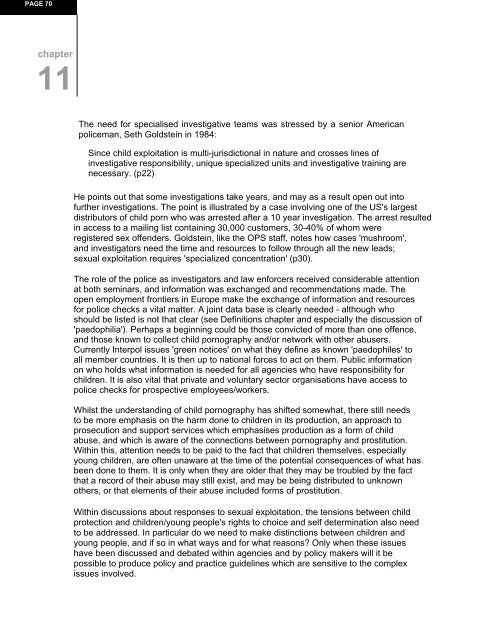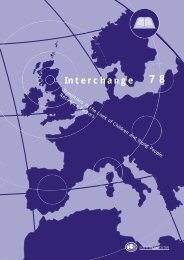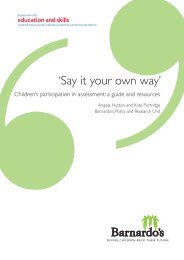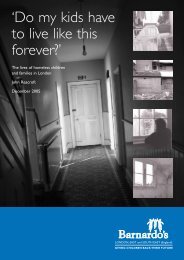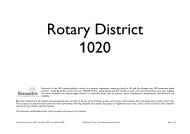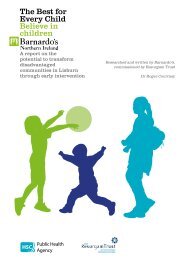Splintered Lives - Barnardo's
Splintered Lives - Barnardo's
Splintered Lives - Barnardo's
You also want an ePaper? Increase the reach of your titles
YUMPU automatically turns print PDFs into web optimized ePapers that Google loves.
PAGE 70<br />
chapter<br />
11<br />
The need for specialised investigative teams was stressed by a senior American<br />
policeman, Seth Goldstein in 1984:<br />
Since child exploitation is multi-jurisdictional in nature and crosses lines of<br />
investigative responsibility, unique specialized units and investigative training are<br />
necessary. (p22)<br />
He points out that some investigations take years, and may as a result open out into<br />
further investigations. The point is illustrated by a case involving one of the US's largest<br />
distributors of child porn who was arrested after a 10 year investigation. The arrest resulted<br />
in access to a mailing list containing 30,000 customers, 30-40% of whom were<br />
registered sex offenders. Goldstein, like the OPS staff, notes how cases 'mushroom',<br />
and investigators need the time and resources to follow through all the new leads;<br />
sexual exploitation requires 'specialized concentration' (p30).<br />
The role of the police as investigators and law enforcers received considerable attention<br />
at both seminars, and information was exchanged and recommendations made. The<br />
open employment frontiers in Europe make the exchange of information and resources<br />
for police checks a vital matter. A joint data base is clearly needed - although who<br />
should be listed is not that clear (see Definitions chapter and especially the discussion of<br />
'paedophilia'). Perhaps a beginning could be those convicted of more than one offence,<br />
and those known to collect child pornography and/or network with other abusers.<br />
Currently Interpol issues 'green notices' on what they define as known 'paedophiles' to<br />
all member countries. It is then up to national forces to act on them. Public information<br />
on who holds what information is needed for all agencies who have responsibility for<br />
children. It is also vital that private and voluntary sector organisations have access to<br />
police checks for prospective employees/workers.<br />
Whilst the understanding of child pornography has shifted somewhat, there still needs<br />
to be more emphasis on the harm done to children in its production, an approach to<br />
prosecution and support services which emphasises production as a form of child<br />
abuse, and which is aware of the connections between pornography and prostitution.<br />
Within this, attention needs to be paid to the fact that children themselves, especially<br />
young children, are often unaware at the time of the potential consequences of what has<br />
been done to them. It is only when they are older that they may be troubled by the fact<br />
that a record of their abuse may still exist, and may be being distributed to unknown<br />
others, or that elements of their abuse included forms of prostitution.<br />
Within discussions about responses to sexual exploitation, the tensions between child<br />
protection and children/young people's rights to choice and self determination also need<br />
to be addressed. In particular do we need to make distinctions between children and<br />
young people, and if so in what ways and for what reasons? Only when these issues<br />
have been discussed and debated within agencies and by policy makers will it be<br />
possible to produce policy and practice guidelines which are sensitive to the complex<br />
issues involved.


